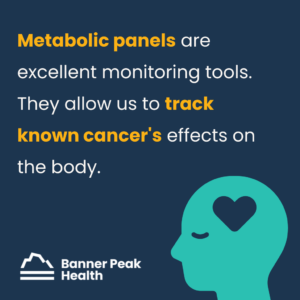An estimated two million new cancers will be diagnosed in the U.S. this year, and over 611,000 people will die from cancer, according to the National Cancer Institute. Unfortunately, cancer will impact so many lives.
Scientists and doctors constantly search for better ways to detect and treat cancer. Metabolic blood panels are one tool we use, but can a metabolic panel detect cancer?
What Is a Metabolic Panel?
A metabolic panel is a blood test that provides a high-level view of the body’s major organ systems. It’s a dashboard that shows how the liver, kidneys, and blood sugar are doing. It also gives insights into white and red blood cell counts.
The term pathophysiology means “how does it come to be.” Once you understand the pathophysiology of cancer, you’ll better understand metabolic panels’ role in the care of cancer patients.
What Is Cancer?
Cells rewrite their blueprint each time they grow and divide. This process can cause errors, and with each error, the cell’s function degrades until, finally, it doesn’t work properly. This is when the cell becomes cancerous.
Cancer is a cell that’s so abnormal that it’s become dangerous. It has unregulated growth, risking local invasion into adjacent tissue. For example, a cancer that starts in the pancreas can spread into adjacent areas of the digestive system. Also, cancer cells can also spread metastatically, beyond the cell’s original location. This can occur with breast cancer, where the cancer cells spread to the lungs, bones, and brain.
Can a Metabolic Panel Detect Cancer?
Returning to the question, “Can a metabolic panel detect cancer?” the answer is yes, but it is not an effective screening tool. Unfortunately, by the time there’s enough cancer in the bone marrow, liver, or kidney to be detected by a metabolic panel, the cancer is often in stage four — metastatic cancer — and it’s too late to treat it effectively.
We need a better method of detection and screening to detect cancer earlier and treat it more effectively.
Are Metabolic Panels Useful for Monitoring Cancer?
Metabolic panels are excellent monitoring tools. They allow us to track known cancer’s effects on the body.
For example, the more cancer cells lodge in the liver, the more they disturb the functioning of the liver. We can monitor the health of the liver using metabolic panels. These insights help us better understand the cancer’s impact on the body.
Using Metabolic Panels in Cancer Care
Perhaps the best use of metabolic panels in cancer care is monitoring the effects of potentially dangerous cancer treatments on patients.
We can use metabolic panels to monitor potential drug toxicity associated with cancer treatment. Cancer treatments can affect the bone marrow, liver, and kidneys, so we can use metabolic panels to monitor those areas closely.
What Early Cancer Detection Tool Is Most Effective?
The best early cancer detection tool we have (for adults over age 50) is the Galleri test. Galleri is a powerful cancer screening test developed by GRAIL.
With Galleri, we can screen for a DNA “fingerprint” common to over 50 types of cancer. The test uses a simple blood test to find the DNA signal. If the test finds the signal, your physician will discuss the next steps to diagnose a potential cancer.
If you think the Galleri test might be appropriate for you or you have more questions about it, contact us. We’re happy to answer any questions you have.
Today’s Takeaways
We’ve answered the question, “Can a metabolic panel detect cancer?” Technically, it can. However, it’s a poor screening tool that detects cancer too late for effective treatment. The Galleri test is a more effective screening tool that catches the disease early enough to save lives.
An ounce of prevention is worth a pound of care. Stay up-to-date on your screenings, and let your doctor know if you have any questions about your health.


Barry Rotman, MD
For over 30 years in medicine, Dr. Rotman has dedicated himself to excellence. With patients’ health as his top priority, he opened his own concierge medical practice in 2007 to practice medicine in a way that lets him truly serve their best interests.




